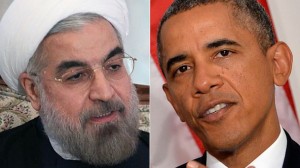 An analyst says Israel and Saudi Arabia are against the normalization of Iran�s ties with the US and other Western countries as they are deeply concerned over the promotion of the Islamic Republic�s kudos as a regional heavyweight,�Press TV�reports.
An analyst says Israel and Saudi Arabia are against the normalization of Iran�s ties with the US and other Western countries as they are deeply concerned over the promotion of the Islamic Republic�s kudos as a regional heavyweight,�Press TV�reports.In a Saturday article on Press TV website, Finian Cunningham�lashed out at Tel Aviv and Riyadh for being �stuck in a war bunker mentality towards Iran� and noted, �The Israeli and Persian Gulf Arab regimes are apoplectic at the prospect of normalizing relations between Iran and the US and its Western allies.�
�If such normalization was to take place and the crippling sanctions on Iran�s prodigious economy were lifted, then the already impressive regional stature of Iran can only but grow even more robust. That outcome is anathema to both the Zionist regime and the House of Saud, as well as the latter�s Wahhabi cronies in the Persian Gulf,� the article added.
Cunningham argued that �Iran provides an alternative political model as a nation state, one that by its very nature undermines the illegitimate anti-democratic foundations of Israel and the oil monarchies.�
The Israeli regime has recently intensified its campaign of allegations and threats against Iran over the country�s nuclear energy program, amid resumption of Tehran�s nuclear talks with six world powers.
Israeli Prime Minister Benjamin Netanyahu has urged the world powers not to ease pressures against Iran and has assured the Israeli parliament that Tel Aviv �can�t surrender the option of a preventive strike� against Tehran.
Meanwhile, in recent days Saudi Arabia and the United Arab Emirates have announced plans to buy advanced missiles, including air-launched cruise missiles, and "bunker-buster" bombs in two separate deals worth $11.8 billion from the US.
According to a report by the Associated Press, the Saudi and Emirati orders were motivated �to stay ahead of claimed military strides by rival Iran.�
Iran and the five permanent members of the UN Security Council - the United States, China, Russia, France and Britain - plus Germany held two days of negotiations over Tehran�s nuclear energy program behind closed doors in the Swiss city of Geneva on October 15-16.
During a meeting on October 15, Iranian Foreign Minister Mohammad Javad Zarif presented Iran�s proposal titled "Closing an Unnecessary Crisis, Opening a New Horizon" to EU Foreign Policy Chief Catherine Ashton, and the representatives of the six countries. The two sides agreed to keep the details of the proposal confidential for the time being.
Following the negotiations, Ashton lauded the talks as the most �detailed� and �substantive� ever between the two sides, describing Iran�s new proposal as an �important contribution.�
Iran and the six powers agreed to meet again in Geneva on November 7-8.
By Press TV
The Iran Project is not responsible for the content of quoted articles.










